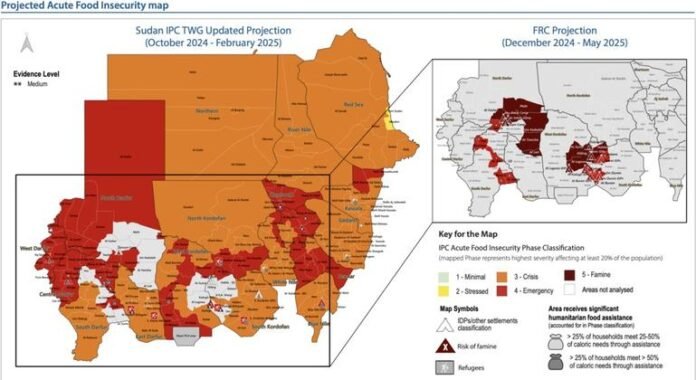According to the IPC initiative, more than 24.6 million people in Sudan – almost half of the country’s population – face high levels of acute food insecurity. The IPC initiative monitors extreme hunger situations worldwide.
The Famine Review Committee (FRC) of the IPC confirmed that famine (IPC Phase 5) exists in at least five areas of Sudan, including Zamzam Camp in North Darfur and parts of the Western Nuba Mountains.
The crisis is likely to worsen, with five additional areas – Umm Qadda, Melit, Al Fashar, At Tabisha and Al Lait areas in North Darfur – likely to reach famine between December 2024 and May 2025.
Additionally, 17 other regions are also vulnerable to famine, particularly those with high numbers of internally displaced people (IDPs).
Affected areas include North and South Darfur, Khartoum and parts of Al Jazeera region.
Extreme human suffering
“Famine is the most extreme form of human suffering, characterized by the catastrophic collapse of systems and resources essential to human survival,” the IPC report states.
“It is not just a food crisis situation, but a profound decline in health, livelihoods and social structures, leaving entire communities in despair.”
However, average rainfall has supported agriculture in areas where security conditions are good. Agricultural activities have been severely disrupted by the months-long war.
According to reports, farmers were forced to abandon their farms and crops looted or destroyed.
Displaced families, especially those living in settlements and government buildings, are deprived of crop benefits.
As a result, 81 lakh people are classified as IPC Phase 4 (emergency) and 6 lakh 38 thousand people are already in Phase 5 (disaster level).
IPC Phase 5 status indicates famine with starvation, death and extreme malnutrition.
War is a major cause
The brutal war, which began in April 2023 between rival armies for power and influence, has driven more than 12 million people from their homes, exacerbated food insecurity and placed a heavy burden on host communities hosting displaced people.
Fierce fighting continues in densely populated areas, with all sides showing gross disregard for international humanitarian law.
There have been massive casualties, sexual violence has occurred and essential infrastructure, including healthcare and education facilities, has been destroyed.
Deadly diseases such as cholera are also spreading rapidly as essential services including health care, clean water and sanitation are reduced.
Recommendations for immediate implementation
The IPC report noted that only an immediate end to the war could help prevent the crisis from worsening.
The report calls for a safe, uninterrupted and sustainable resumption of humanitarian assistance, particularly in war-torn areas, and a significant increase in multi-sectoral humanitarian assistance.

